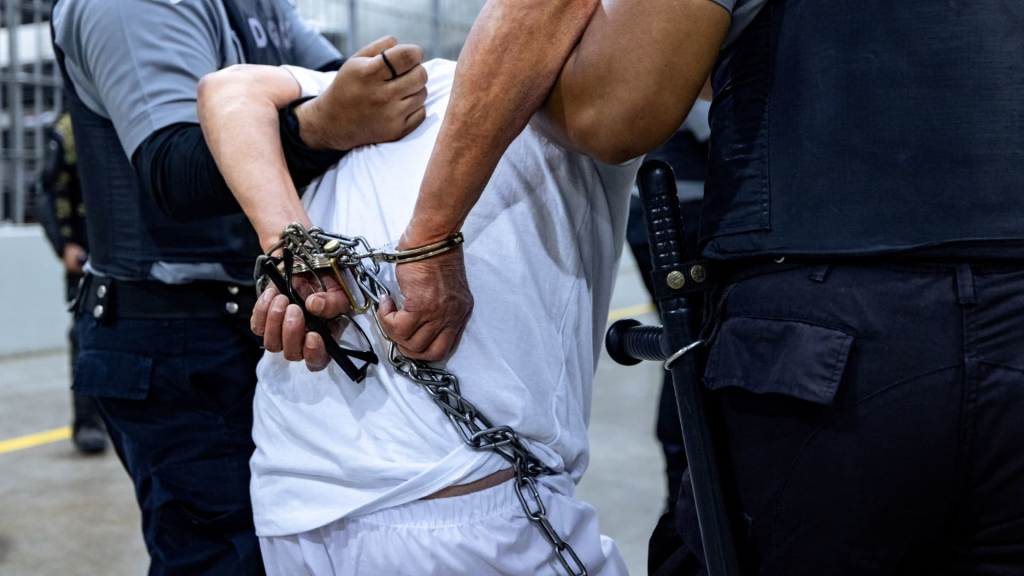In a significant legal maneuver early Saturday, the U.S. Supreme Court temporarily halted the deportation of Venezuelan men in immigration custody. This decision came after their attorneys expressed concerns that deportations could proceed without the required judicial review as mandated by the justices.
The Court’s unsigned decision stated, “The Government is directed not to remove any member of the putative class of detainees from the United States until further order of this Court.”
Conservative Justices Clarence Thomas and Samuel Alito dissented publicly from the ruling, issued around 12:55 a.m. ET.
The American Civil Liberties Union (ACLU) filed urgent requests in several courts on Friday, including at the Supreme Court, after reports indicated that some detainees had already been taken onto buses for deportation.
The ACLU has warned that the swift actions by the administration could unlawfully deploy a 1798 law, typically invoked during wartime, without providing these individuals a fair chance to contest their deportations—as required by the Supreme Court.
At the time of this reporting, the White House had not responded to inquiries regarding the Supreme Court’s decision.
This case highlights potential conflicts regarding governmental authority, and raises questions about whether the Trump administration is adhering to principles set forth by the Supreme Court. A significant constitutional clash could loom between the branches of government.
Legal Entanglements Across Courts
During a court hearing on Friday, a government attorney indicated early uncertainty regarding plans by the Department of Homeland Security to deport the men, though prospective deportations on Saturday had not been ruled out.
Meanwhile, one of Trump’s legal battles saw a temporary reprieve when an appeals court stayed District Judge James Boasberg’s threat of contempt charges.
Judge Boasberg also denied an ACLU motion to prevent Trump from deporting suspected members of Tren de Aragua, referencing an April 7 Supreme Court ruling that permitted the use of the Alien Enemies Act with certain stipulations.
Despite concerns about potential deportations occurring promptly, Boasberg noted, “At this point, I just don’t think I have the power to do anything about it.”
Trump had previously called for the impeachment of Boasberg following a negative ruling, which elicited a rare rebuttal from U.S. Chief Justice John Roberts.
As legal discussions unfolded in Boasberg’s court, the ACLU was concurrently working on measures to prevent the deportation of Venezuelans detained in Texas.
ACLU lawyers approached the Supreme Court for relief after not receiving a timely response to earlier motions filed in U.S. District Court in Abilene, Texas, and at the Fifth U.S. Circuit Court of Appeals in New Orleans.
The Supreme Court’s order on Saturday requested that the administration provide a response to the ACLU after actions by the 5th Circuit.
ACLU representatives indicated that some men had received notifications designating them as members of Tren de Aragua.
The crux of the matter centers on whether the Trump administration has complied with the Supreme Court’s requirements for due process for the detainees prior to their extradition, potentially to dangerous facilities in El Salvador.
Friday’s assessments left unclear how many individuals could face deportation, and where these deportees may be sent.
Assessing Notice Adequacy
The scheduled deportation would mark the first instance following a 5-4 ruling from the Supreme Court, allowing removals under the 1798 law but emphasizing, “the notice must be afforded within a reasonable time and in such a manner as will allow them to actually seek habeas relief in the proper venue before such removal occurs.”
The legal principle of habeas corpus empowers detainees to challenge the legality of their detention, representing a foundational right in U.S. law.
The Supreme Court did not specify how much notice is deemed sufficient. Advocates nationwide have suggested 30 days’ notice for migrants to prepare their defense against deportation. The Trump administration has not publicly clarified how much notice it plans to provide.
The ACLU submitted a photo of one of the notices to the court, which stated, “You have been determined to be an Alien Enemy subject to apprehension, restraint, and removal.” The identity of the name was redacted, indicating the migrant had refused to sign the document on Friday.
When questioned about the deportations on Friday, Trump professed limited knowledge of the case but remarked, “If they’re bad people, I would certainly authorize it.” He further stated, “That’s why I was elected. A judge wasn’t elected,” during a press briefing at the White House.
Defense attorneys, alongside congressional Democrats, have urged the administration to clarify its basis for labeling these Venezuelans as gang members, noting that while Tren de Aragua is involved in human trafficking and other criminal activities in South America, its presence in the U.S. is significantly less than that in Latin America.
Assistant Secretary for U.S. Homeland Security Tricia McLaughlin responded, “We are not going to reveal the details of counter-terrorism operations, but we are complying with the Supreme Court’s ruling.”
Earlier this month, on March 15, the Trump administration deported over 130 individuals classified as Tren de Aragua members to El Salvador. Many relatives and lawyers contest these individuals were misidentified and denied a fair opportunity to contest government allegations regarding their gang affiliations.


























